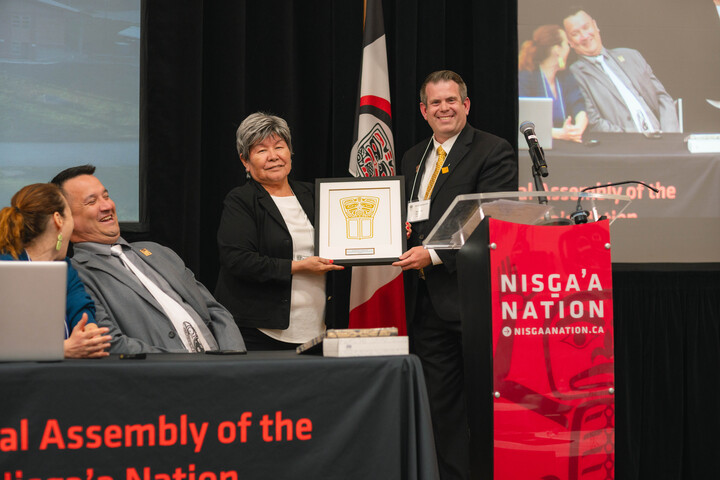
Reconciliation
Supsūpii•po’omaaksin* In the spirit of planting seeds
Nov 20, 2024
(Above) Todd Korol Photography. Willis Iron Shirt and Joseph Yellow Horn of Piikani Nation
A major reforestation project is underway to restore one of the largest riparian cottonwood forests in North America and preserve its land for future generations of Piikani youth. Rooted in Indigenous ecological knowledge and respect for the people who have stewarded it for millenia, a partnership has emerged between TELUS Environmental Solutions and Piikani Nation.
For generations, the Náápi Otsíthaatan (Oldman River) watershed has provided for the hunting, fishing, gathering and ceremonial needs of Piikani Nation members. In recent years, the community has grown increasingly concerned about the ecological decline they’ve witnessed in the area as a result of climate change and increased industrial and agricultural activity.

Todd Korol Photography.
“Over the last few years, we’ve seen shorter seasons with our berries, sweetgrass, mint, harvesting of medicines, and with the availability of fish,” stated Noreen Plain Eagle, Lands Manager with Piikani Nation.
The once numerous willows and cottonwoods, which are essential for mitigating flash flooding and protecting vulnerable fish species like the westslope cutthroat trout and bull trout, have dwindled.
“Our members have said, ‘Are we ever going to replace those trees? Is it ever going to change?’ And absolutely, what we see now is, down the road, it’s going to be a legacy of our partnership that’s going to be there,” Plain Eagle shared.
Together, TELUS and Piikani have already planted tens of thousands of stems of native cottonwood, poplar, aspen, and shrubs such as silverberry (known to Piikani as Wolf Willow), which are maintaining their growth wonderfully, according to Plain Eagle. That number will grow to 350,000 by the end of 2025, completing the rehabilitation of 300 hectares of high priority land identified by the Piikani Lands Department, at no cost to the Nation.
Beyond the ecological benefits, Plain Eagle also points to the economic and employment success stories that are sprouting from this partnership. “We’ve been able to hire members in our community to help with the cutting, and planting is going to be long-term employment for our community members.”
A total of 16 Nation members have been trained in activities like cutting, planting and ATV operation through customized training opportunities that engaged community members in these rehabilitation efforts and equipped them to participate in additional land management strategies in the future.
“Those are things that this partnership is bringing to the table, those kinds of resources and opportunities. It’s creating employment for our community members, it’s creating awareness among our youth, and it’s creating long-term stability in the river valley that’s been lacking for a long time, and it’s going to come from us and our partners,” stated Plain Eagle.
While a key goal of this partnership is to reforest the area with 300,000 trees and restore ecological stability, it won’t end there. TELUS and Piikani are committed to deepening this relationship and building a meaningful dialogue around how they can continue to work together and support the community’s success. “As we’re moving forward, there are other opportunities that are starting to surface. This is just the beginning,” said Plain Eagle.
Restoring the Náápi Otsíthaatan watershed in collaboration with Piikani is an important and meaningful way that TELUS is advancing reconciliation while accelerating climate action.
Explore this year’s report to read more stories from the Indigenous partners, communities and individuals that TELUS is partnering with as we implement our Indigenous Reconciliation Action Plan:
telus.com/reconciliation
.*Blackfoot translation


